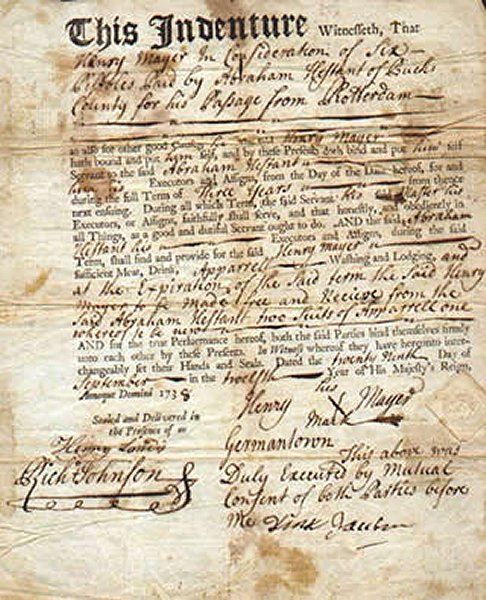Indentured servants
Indentured Servants
Yeovilians who left to work on plantations in the Colonies
The term 'indentured servant' arose in the context of a system for financing immigration to North America primarily during the colonial period. Europeans who could not afford passage to America sold themselves to merchants and seamen in exchange for transportation to the colonies. This arrangement was spelled out in a contract, called an indenture, in which the emigrant agreed to work without compensation for a fixed term, typically four or five years. Servants often entered into such contracts freely but sometimes merchants and ship captains, in a practice called 'spiriting', kidnapped impoverished children and youths, forcing them into an indenture. Shiploads of these volunteers and victims disembarked in colonial port towns and along river banks, where ship masters sold them to plantation owners and others who needed workers. These strangers became the servants’ masters and literally owned them for the duration of their contracts.
Labour shortages in America’s middle colonies enabled indentured servitude to flourish there for more than 150 years. Increased African slave imports during the eighteenth century triggered its decline. By the early 1800s the system had disappeared among Britons going to the United States.
During the seventeenth century most of the white labourers in Maryland and Virginia came from England as indentured servants. In fact, between one-half and two-thirds of white immigrants to the American colonies between the 1630s and the American Revolution had come under indentures.
Most indentured servants left England from either Bristol, London or Liverpool. In 1654 the Bristol City Council passed an ordinance requiring that a Register of Servants destined for the Colonies be kept, the purpose being to prevent the practice of dumping innocent youths into servitude. The registers cover the period 1654 to 1686. Of the total of 10,000 servants in these registers, almost all came from the West Country, the West Midlands, or from Wales. Just five, those listed below, came from Yeovil.
The Yeovil Indentured Servants
|
13 July 1657 |
Elizabeth
Martine,
Spinster
of
Yeovil,
was
indentured
for four
years to
merchant
Thomas
Gwin of
Bristol,
to serve
in
Virginia. |
|
10 August 1659 |
Richard
Wood
of Evill,
Somerset,
glover,
was
indentured
for four
years to
merchant
William
Rodney,
to serve
in
Virginia. |
|
6 February 1685 |
John
Pooler
of
Yeovil,
Somerset,
was
indentured
for
seven
years to
John
Napper.
To serve
in
Jamaica.
Sailed
by
America
Merchant. |
|
2 May 1685 |
William Fivian of Yeovil, Somerset, was indentured for seven years to John Napper. To serve in Jamaica. Sailed by Dragon. |
|
4 May 1685 |
Walter Summers of Preston (Plucknett), Somerset, was indentured for four years to Thomas Kirke. To serve in Jamaica. Sailed by Dragon. |
Gallery

This photograph
features in my
book "A-Z
of Yeovil"
A typical Servant's Indenture (albeit not one of the Yeovilians).